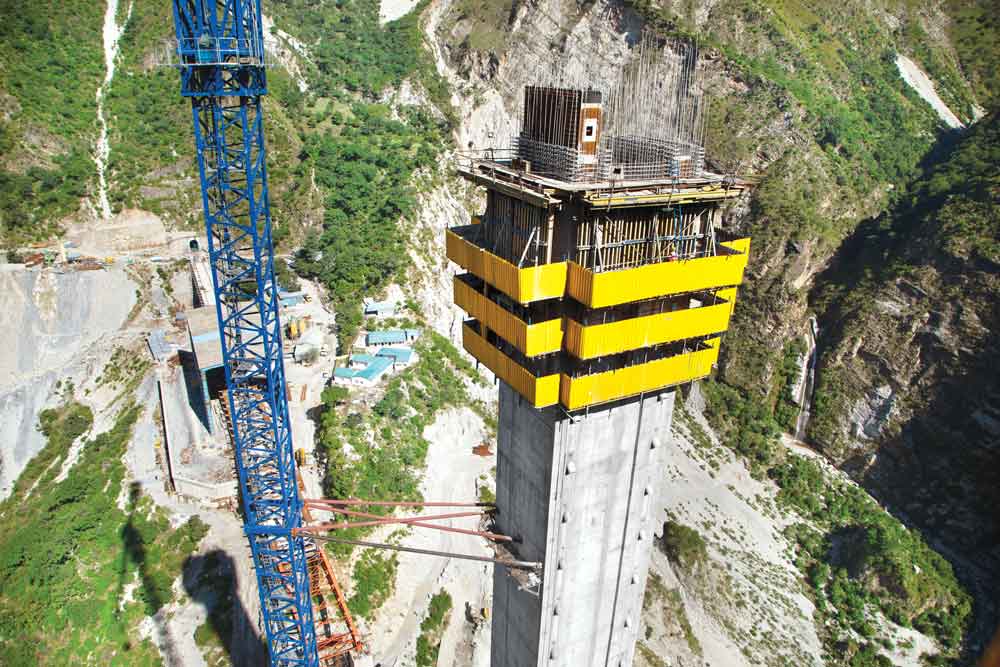Bridging the HIMALAYAS with an ENGINEERING MARVEL
Set against the dramatic scenery of India's north-western region, works are underway to deliver a vital section of the Jammu-Udhampur-Srinagar-Baramulla railway link. However, with heavy seasonal storms and rough terrain, Doka India's team had their work cut out for them in providing a timely solution for India's first cable stay rail bridge.

Set against the dramatic scenery of India's north-western region, works are underway to deliver a vital section of the Jammu-Udhampur-Srinagar-Baramulla railway link. However, with heavy seasonal storms and rough terrain, Doka India's team had their work cut out for them in providing a timely solution for India's first cable stay rail bridge.
Located between the states of Jammu and Kashmir in the foothills of the Himalayas, the Katra-Qazigund section of the Jammu-Udhampur-Srinagar-Baramulla railway link has a history going back to 1994. Having been initially approved for construction and with several years of work invested into its numerous bridges and tunnels, progress slowed as engineers faced increasing challenges from both adverse geology and poor accessibility. Amongst the project's greatest challenges came from finding an engineering solution to connect the Katra and Reasi section of the line, which is separated by a naturally occurring ravine of approximately 330 m in depth. In addition, once completed, the structure would need to withstand a variety of severe weather including torrential rain, snow, ice, and high winds, capable of reaching speeds in excess of 100 km per hour.
Named the Anjikhad Railway Bridge, Doka India proposed an effective and efficient formwork solution for the cable-stayed, single-pylon to work with the site's complex geology. This meant constructing the pylon in a vertical slope using micropyles of 40 m in depth around the circumference of a 20-m well foundation. HCC selected Doka as their formwork partner to manage and response to the demands and challenges for such a prestigious project. To achieve the construction of the pylon itself, Doka relied on its Automatic Climbing Formwork SKE50, which provided excellent protection for site teams, while safeguarding them from the adverse weather and thanks to the guided lifting system, no deviation from the construction schedule was required. Supporting the climbing system, the project used Large Area Formwork Top50 extensively, thanks to its high degree of flexibility which meant a lot of it could be pre-assembled, while also remaining on the platforms during climbing, reducing the reliance on cranes, resulting in the project becoming crane-independent after the first step.

Additional features that helped to move the pylon construction along included jump shuttering and a pump concreting system, which not only provided higher safety for site teams, but also reduced the overall construction time by nearly 30%.
 Speaking on behalf of HCC, the project-in-charge, Ajay Kumar Pashine stated, “It was wonderful working with Doka team during the installation of SKE 50 Auto Climbing System and pylon formwork Top 50 systems at AnjiKhad cable stayed bridge project Jammu & Kashmir. We are happy with service and technical support provided by the Doka team, for implementation of system to ensure smooth operations. By the installation of the system the concrete time cycle was reduced and according to our planning, we have achieved our progress.”
Speaking on behalf of HCC, the project-in-charge, Ajay Kumar Pashine stated, “It was wonderful working with Doka team during the installation of SKE 50 Auto Climbing System and pylon formwork Top 50 systems at AnjiKhad cable stayed bridge project Jammu & Kashmir. We are happy with service and technical support provided by the Doka team, for implementation of system to ensure smooth operations. By the installation of the system the concrete time cycle was reduced and according to our planning, we have achieved our progress.”
 Speaking on behalf of Doka India, senior formwork instructor, A.N Singh commented, “The success of the project so far has been achieved through a combination of technology and engineering excellence. In finding an optimal way to deliver such a complicated structure in such an inhospitable environment, we are proud to say we've delivered India's first cable-stayed railway bridge.”
Speaking on behalf of Doka India, senior formwork instructor, A.N Singh commented, “The success of the project so far has been achieved through a combination of technology and engineering excellence. In finding an optimal way to deliver such a complicated structure in such an inhospitable environment, we are proud to say we've delivered India's first cable-stayed railway bridge.”
Standing at an incline of seven degrees and at a height of 331 m, works are currently taking place to complete the bridge, which will reach a length 290 m across the main span (473.25 m in total) and require 96 support cables to hold it securely in place. Once completed, the bridge will also come equipped with a monitoring system, which will help to provide valuable data as to how the geological and meteorological conditions affect the overall structure.
At Doka, we accompany our clients throughout the project lifecycle. From project management to services and products, Doka is your construction partner for infrastructure, power, industrial, institutional and residential.
Hits: 0












